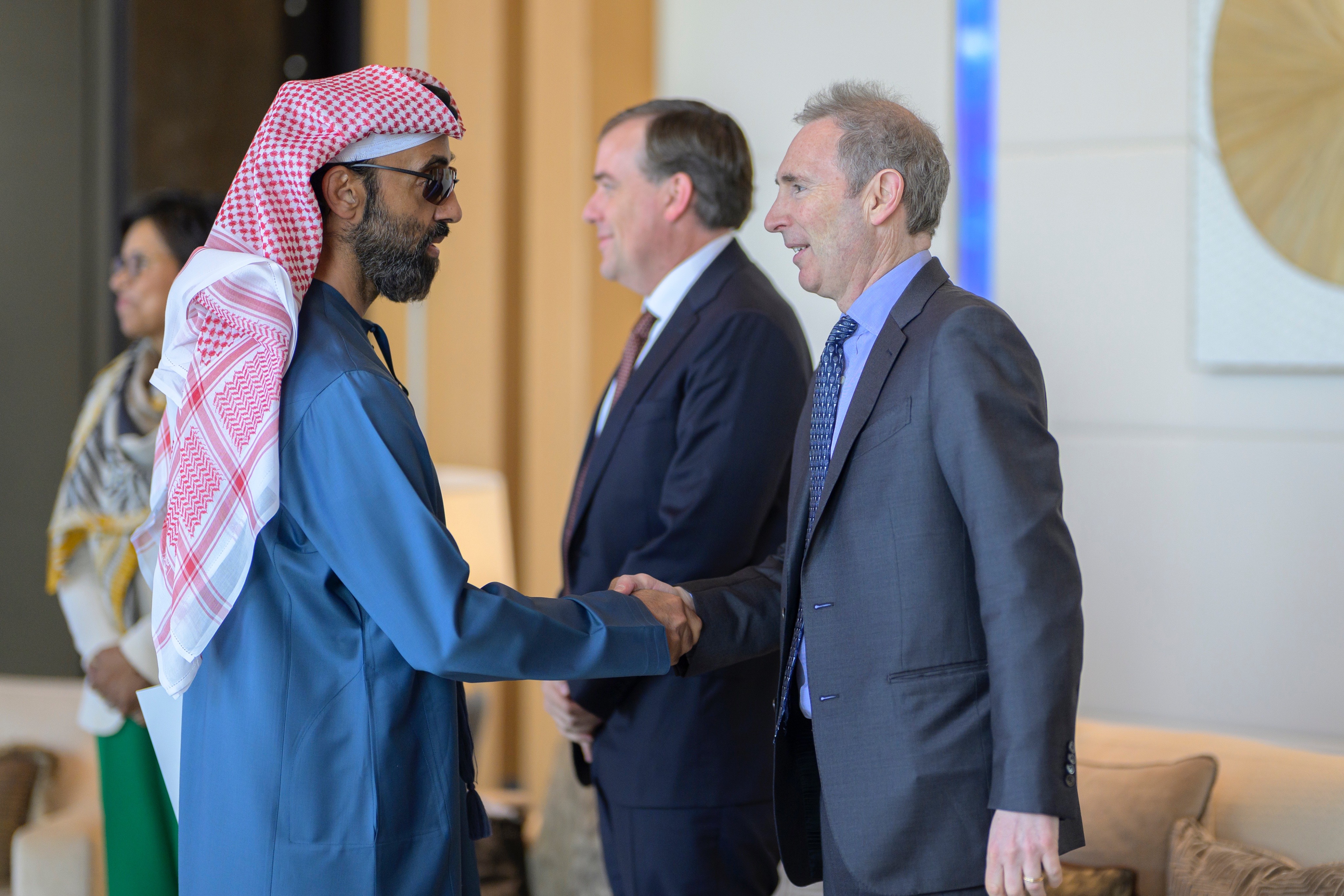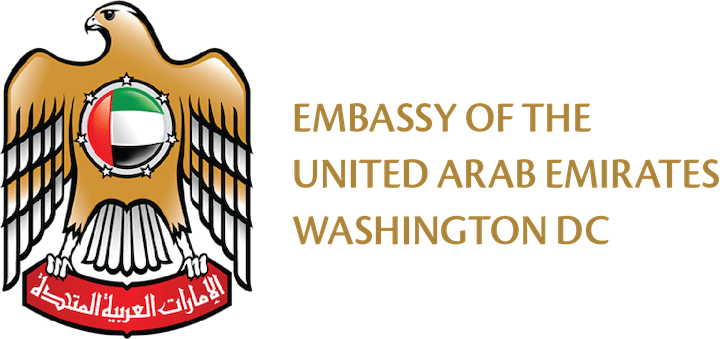The United States and the UAE enjoy a robust trade and investment relationship, much of which now has little direct relationship to UAE oil exports. This relationship is one of the fastest-growing US economic partnerships, globally and in the Gulf region. In 2024, the US had a $19.5 billion trade surplus with the UAE, the US’ third largest trade surplus globally.
The UAE has one of the most open economies in the world. And its vigorous economic partnership with the United States reflects the UAE’s role as a regional leader in terms of economic reform, openness to international trade and investment, and political stability.
In 2012, the UAE and US partnered to form an Economic Policy Dialogue (EPD), which serves as an annual platform to develop initiatives that are intended to strengthen the economic, trade, and commercial relationships between the two countries.
During his historic visit to the US, President HH Sheikh Mohamed Bin Zayed Al Nahyan met with the former US Secretary of Commerce Gina Raimondo. Their meeting highlighted the ongoing development of UAE-US relations in the fields of economics, trade, investment, and technology, which align with both nations' shared vision for achieving sustainable economic prosperity.

Partners in a Globalized World
The volume of US exports and foreign direct investment into the UAE in recent years has grown dramatically and is likely to continue to grow in the future. This growth reflects the increasingly diversified UAE economy as well as the country's leading role as a modernizing influence in the Arab world.
- The UAE is the United States’ single largest export market in the Middle East, with $34.4 billion in exports in 2024 – the sixteenth straight year the UAE has held this distinction.
- The UAE has trade relations with every state in the United States, as well as the District of Columbia, Puerto Rico, and the Virgin Islands.
- The UAE pegs its currency, the dirham, to the dollar.
- More than 1,500 US firms have a presence in UAE, from Boeing and IBM to Microsoft and Google.
High Value Trade and Investment
The trade relationship between the UAE and the United States is characterized by a set of high-value trade and investment activities.
- UAE total direct investment in the US exceeds $1 trillion, a significant contribution to the American economy.
- In 2024, Microsoft and G42, the UAE’s artificial intelligence (AI) technology holding company announced a $1.5 billion strategic investment by Microsoft in G42.
- Masdar has invested almost 1 billion dollars in the United States to date on various green energy projects in various states
- At the 2023 Dubai Airshow, Emirates and Boeing finalized an agreement for 55 Boeing 777-9s and 35 777-8s valued at $8.8 billion. This takes to Emirates’ fleet of 777 X orders to 205 units. Emirates operates the world’s largest fleet of Boeing 777 aircraft.
- Mubadala co-invested with Vista Equity Partners LLC in the $8.4 billion acquisition of tax software company Avalara Inc. Avalara’s tax compliance automation software solutions utilize over 1,200 signed partner integrations across leading ecommerce and billing systems.
- In 2020, Mubadala has invested $150 million in Enviva, the largest producer of industrial wood pellets. This investment helps the world replace coal and other fuels in the transition to a low-carbon future.
- Etihad currently has 63 Boeing aircraft in its fleet, including 39 787s and 24 777s. In 2019, Etihad announced that one of its 787 Dreamliners would serve as a flying laboratory for testing procedures and initiatives that could further reduce fuel consumption and carbon emission.
- Flydubai’s significant $11 billion order for Boeing 787 Dreamliners has also supported its diversification of its existing fleet of all-Boeing 737 aircraft.
- In 2016, US startup incubator 1776 opened an office in Dubai – the DC-based organization’s first international location.
- GlobalFoundries, a joint venture between AMD and Advanced Technology Investment Company (ATIC) of Abu Dhabi, opened a US-headquartered semiconductor manufacturing company that includes a $4.2 billion semiconductor fabrication plant in upstate New York in 2009. In 2014, ATIC announced an additional $10 billion investment to expand the facility, which is now one of the largest and most advanced semiconductor manufacturing facilities in the world. GlobalFoundries employs nearly 3,000 people at the Upstate New York facility.
- In 2014, UAE-based Gulftainer signed a 35-year agreement to operate a container and cargo terminal at Port Canaveral on Florida's east coast, representing an investment of up to $100 million in equipment and jobs.
- Westinghouse is taking part in a South Korean-led consortium that is building four nuclear reactors for commercial energy generation in the UAE, the first of which was connected to the electricity grid in 2020.
- Emirati company Taqa Global has invested in a 205.5 megawatt Lakefield wind project in Jackson County, Minnesota. The field produces enough sustainable energy to power over 60,000 homes.
- The Mubadala Investment Company and General Electric have multiple cooperative projects, including an $8 billion joint venture in high technology.
- In December 2010, the Mubadala Investment Company made an additional investment of $500 million in the Carlyle Group general partnership. The Carlyle Group first sold Mubadala a 7.5 percent stake in its general partnership in September 2006.
- The Abu Dhabi Investment Authority (ADIA) acquired an 11 percent share in the Hyatt Hotels Group in December 2009.
Through significant investments in the United States for over 30 years, the UAE has been a dependable and long-term contributor to the US economy, providing liquidity to US capital markets, growth for US companies, and job security for US workers.
UAE as a Global Energy Supplier
- US companies are heavily involved as partners and suppliers to UAE energy companies.
- Abu Dhabi was the only OPEC member not to nationalize the holdings of foreign investors in the mid-1970s. Today international oil companies from the United States, Japan, France, Britain, and other countries continue to hold combined equity stakes of between 40 and 100 percent in Abu Dhabi’s vast oil concessions.
- In addition to partnering with US companies on the development of its oil resources, the UAE is also a consumer of US-produced energy. The UAE has recently imported liquefied natural gas from US producers.
- The UAE is making a $15 billion investment in clean energy technologies through its Masdar initiative. The country has also committed to increase the contribution of clean energy in the national energy mix to 50% by 2050 and reduce the carbon footprint of power generation by 70%.
- Reflecting the UAE’s renewable energy leadership, the International Renewable Energy Agency (IRENA) is headquartered in Abu Dhabi.
- The UAE will continue its long tradition of responsible energy stewardship as it diversifies its economy, expands hydrocarbon reserves, and contributes to the development of alternative energy sources.
US-UAE Business Council
The UAE and the United States continue to explore ways to enhance and build upon an already robust trade relationship. The US-UAE Business Council, established in 2007, supports the expansion of the commercial relationship through business-to-business initiatives.
The UAE is enthusiastic about advancing the many new joint ventures and partnerships it has in place with major US companies. From a UAE perspective, constructive international partnerships and joint ventures can provide capacity and skills for the local economy, in addition to the traditional benefits of investment.
